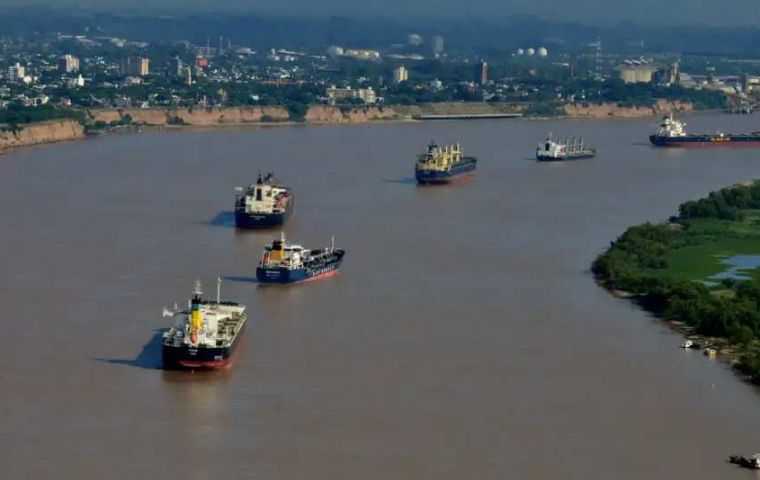MercoPress. South Atlantic News Agency
Paraná downspout means heavy losses for Argentine exports
 The losses included US$ 138.25 million stemming from an increase in costs due to the so-called “false freight”
The losses included US$ 138.25 million stemming from an increase in costs due to the so-called “false freight” A most unusual low water level of the Paraná river has caused losses of nearly US$ 280 million so far in 2022 to Argentine rural producers and exporters, it was reported.
In addition to a drop in sales, foreign traders also incurred default with foreign buyers, which entailed heavy penalties. Due to the adverse hydrological conditions river navigability has been severely compromised.
Grain exporters have suffered losses of US$ 279,689,670 as a consequence of the low amount of cargo that ships can hold not to run aground, according to a report from the Rosario Stock Exchange (BCR).
The document also showed that the losses also included US$ 138.25 million stemming from an increase in costs due to the so-called “false freight,” which is the impossibility of loading vessels of lower capacity at full capacity.
These vessels could not complete their cargoes in ports further south or in Brazil, because their remaining capacity does not economically justify mooring them in other terminals, forcing them to go back out to sea with fewer goods onboard.
A recent improvement in the water flow of the Paraná river has brought some relief to agribusiness. The National Water Institute (INA) announced earlier this week that although conditions are, in general, better than those observed in 2020 and 2021, the climatic perspective “still does not allow establishing a temporary limit of the predominant low water scenario started in March 2020.″
The BCR report also states that vessels of a greater capacity usually complete their cargoes with goods loaded on the Atlantic coast such as Quequén, Necochea, and Bahía Blanca.
”Although this is usual practice in normal years, since larger vessels cannot be fully loaded in the Up-River ports due to their design draft, the downturn forced to increase this additional cargo,“ the BCR stressed. That change resulted in an extra cost of US$115.6 million to be paid by Argentine exporters.
Meanwhile, the cost of lower export prices for domestic soybean oil and meal, associated with the risk, amounted to US$25.8 million. ”There is a punishment in the price of these Argentine products that translates into a downward pressure on Argentine FOB premiums about other origins, such as Brazil,” the document also pointed out.
In mid-January, the INA indicated that the river registered -44 centimeters above sea level, a level not reached since 1944. The historical low water level that began in March 2021, not only caused economic consequences but also changes in the environment as well as in the productive and social life of cities along the Paraná coastline. It also affected the fauna and complicated water-requiring industrial output.




Top Comments
Disclaimer & comment rulesCommenting for this story is now closed.
If you have a Facebook account, become a fan and comment on our Facebook Page!